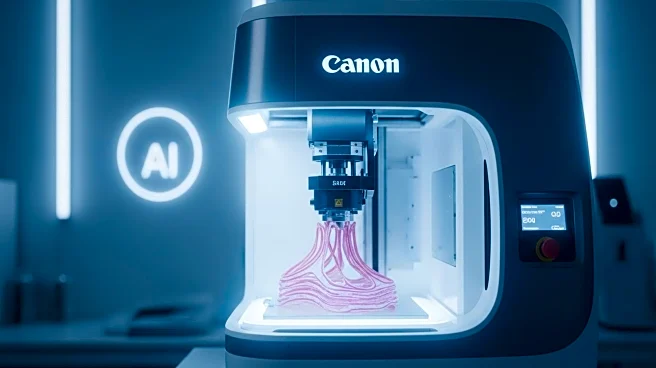What's Happening?
A significant advancement in regenerative medicine has been achieved by researchers at UMC Utrecht and Utrecht University, who have developed a novel bioprinting technology named GRACE. This technology integrates artificial intelligence with advanced imaging to revolutionize 3D bioprinting. Led by Riccardo Levato, the team has created a volumetric bioprinting system that constructs living tissues rapidly while adapting in real-time. GRACE addresses challenges in tissue engineering by enhancing cell survival and function within printed constructs. Unlike traditional bioprinting, which involves layer-by-layer deposition of cells, GRACE uses light to solidify a photosensitive gel infused with cells in a single step, reducing mechanical stress and preserving cell integrity.
Why It's Important?
The development of GRACE represents a leap forward in bioprinting technology, offering potential benefits for tissue repair, drug testing, and organ replacement. By integrating AI-driven imaging, GRACE can dynamically design vascular networks that align with the spatial organization of cells, improving tissue viability and function. This innovation could significantly impact the field of regenerative medicine by providing a more efficient and precise method for creating complex tissues. The ability to produce large-scale, cell-laden tissues with integrated vasculature could address the global shortage of organ donors and advance personalized medicine.
What's Next?
The research team plans to expand GRACE's capabilities to print densely cellular tissues such as heart and liver, which require intricate vascular networks. They aim to make this technology accessible to other research groups worldwide, fostering innovation in adaptive volumetric bioprinting. Further biological investigation is needed to mature printed cells to achieve full native tissue functionality. As the technology progresses, it may redefine approaches to repairing and replacing human tissues, bringing personalized medicine closer to reality.
Beyond the Headlines
GRACE's development highlights the growing intersection of artificial intelligence and biofabrication, where machines not only execute but also understand and adapt to biological complexity. This intelligent manufacturing platform could redefine regenerative medicine, offering a responsive, context-aware fabrication process. The technology symbolizes a shift towards creating functional, transplantable organs, potentially alleviating the global shortage of organ donors and ushering in a new era of patient-specific therapies.










